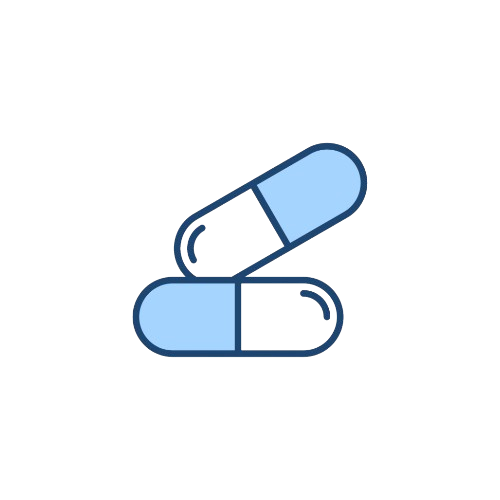Nitrofurantoin + Nitrofurantoin Microcrystals
Allopathic
Indications
- Approved Indications:
- Treatment of acute uncomplicated urinary tract infections (UTIs) caused by susceptible bacteria including Escherichia coli, Staphylococcus saprophyticus, Enterococcus faecalis, and others.
- Prophylaxis and suppression of recurrent UTIs, especially in patients prone to frequent infections.
- Treatment of lower urinary tract infections (cystitis) with symptomatic relief.
- Off-label Uses:
- Sometimes used in complicated UTIs under specialist care when other options are limited.
- Asymptomatic bacteriuria treatment in pregnancy under supervision.
Dosage & Administration
- Adults:
- Standard dose for acute infection: 100 mg orally every 12 hours for 5 to 7 days.
- For prophylaxis: 50–100 mg orally once daily at bedtime.
- Elderly:
- Same dosing, but with caution due to risk of toxicity and renal impairment.
- Pediatrics (≥1 month):
- Dose generally 5–7 mg/kg/day divided every 12 hours, not exceeding adult doses.
- Renal Impairment:
- Contraindicated if creatinine clearance <60 mL/min.
- Hepatic Impairment:
- No specific dose adjustment but monitor liver function.
- Route: Oral.
- Duration: Treatment courses generally last 5–7 days; prophylaxis duration individualized.
- Formulation Notes:
- Combination of macrocrystals and microcrystals provides gradual and sustained urinary concentrations, improving tolerability and effectiveness.
- Macrocrystals dissolve slowly; microcrystals dissolve faster, helping rapid onset.
Mechanism of Action (MOA)
Nitrofurantoin undergoes enzymatic reduction inside bacterial cells by flavoproteins to reactive intermediates, which damage bacterial DNA, ribosomal proteins, and other macromolecules, inhibiting vital bacterial biochemical processes. This results in bacterial cell death. The combination of microcrystals and macrocrystals allows for sustained antibacterial concentrations in the urinary tract.
Pharmacokinetics
- Absorption: Well absorbed orally; macrocrystals dissolve slowly while microcrystals dissolve faster, providing a biphasic release.
- Distribution: Concentrates mainly in urine; low plasma protein binding (~38%).
- Metabolism: Minimal hepatic metabolism.
- Half-life: Approximately 20 minutes to 1 hour.
- Elimination: Rapid urinary excretion of unchanged drug.
- Onset: Therapeutic urinary concentrations achieved within hours.
Pregnancy Category & Lactation
- Pregnancy: FDA Category B. Considered relatively safe for use in pregnancy for UTIs but avoided near term due to potential neonatal hemolytic anemia.
- Lactation: Excreted into breast milk in small amounts. Generally considered compatible with breastfeeding; monitor infant for any adverse effects.
Therapeutic Class
- Primary Class: Urinary tract antibacterial
- Subclass: Nitrofuran derivative, urinary antiseptic
Contraindications
- Hypersensitivity to nitrofurantoin or any nitrofuran derivatives.
- Severe renal impairment (creatinine clearance <60 mL/min).
- Pregnancy at term (38–42 weeks gestation).
- Neonates under 1 month old.
- History of cholestatic jaundice or hepatic dysfunction related to nitrofurantoin.
Warnings & Precautions
- Monitor for pulmonary toxicity: acute, subacute, or chronic pneumonitis and fibrosis.
- Risk of hepatotoxicity, including cholestatic jaundice.
- Peripheral neuropathy risk, especially with prolonged use or in patients with diabetes or renal impairment.
- Avoid use in significant renal impairment due to risk of toxicity.
- Discontinue if signs of hypersensitivity, pulmonary or hepatic adverse reactions appear.
Side Effects
- Gastrointestinal: Nausea, vomiting, loss of appetite.
- Urinary: Brown discoloration of urine (harmless).
- Respiratory: Rare but serious pulmonary reactions.
- Neurologic: Peripheral neuropathy, headache, dizziness.
- Hepatic: Rare hepatitis, cholestatic jaundice.
- Hypersensitivity: Rash, fever, eosinophilia.
- Hematologic: Hemolytic anemia in G6PD deficiency.
Drug Interactions
- Antacids containing magnesium trisilicate reduce absorption.
- Probenecid and sulfinpyrazone decrease renal excretion, increasing toxicity risk.
- No significant CYP450 enzyme interactions.
- Caution with other nephrotoxic drugs.
Recent Updates or Guidelines
- Continued recommendation as first-line for uncomplicated cystitis.
- Emphasis on avoidance in patients with renal impairment.
- Increased caution for long-term use due to pulmonary toxicity risks.
- Updated guidelines stress monitoring liver function and pulmonary symptoms.
Storage Conditions
- Store at 20°C to 25°C (68°F to 77°F).
- Protect from moisture and light.
- Keep tightly closed in original container.
- No refrigeration or reconstitution required.
- Keep out of reach of children.
